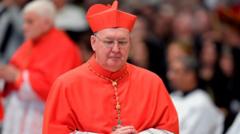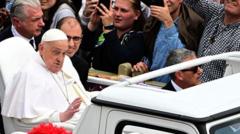Pope Francis died at 88, following a stroke, prompting an outpouring of tributes and raising questions about the future direction of the Catholic Church.
Pope Francis Passes Away at 88, Leaving a Legacy of Compassion and Inclusion

Pope Francis Passes Away at 88, Leaving a Legacy of Compassion and Inclusion
Thousands Mourn as World Reacts to the Death of the First Latin American Pope
April 21, 2025, 2:23 p.m. ET — Vatican City
Pope Francis, beloved by millions for his advocacy of the marginalized, died on Monday at the age of 88 after suffering a stroke. His passing has reverberated around the world, with mourners gathering in St. Peter’s Square and tributes flooding in from global leaders in recognition of his legacy as the first Latin American pontiff.
Having served for twelve years, Pope Francis sought to reshape the Catholic Church, emphasizing inclusivity, care for the poor, and a commitment to social justice. His death on the day after he blessed the faithful during Easter Mass took many by surprise, highlighting the fragile state of his health despite recent public appearances.
The Vatican issued a statement confirming his passing at 7:35 a.m. and described his cause of death as a stroke followed by a coma and cardiac collapse. As the world mourns, the immediate future of the Catholic Church hangs in a delicate balance, with leaders faced with a significant choice: to elect a successor who will continue Francis’ mission of inclusivity or revert to the more traditional paths of previous popes.
In the wake of his death, tributes have poured in. Cardinal Kevin Farrell, who will oversee church affairs as the camerlengo until a new pope is elected, urged the community to hold up Francis’ vision. Globally recognized leaders, including United Nations Chief António Guterres, have celebrated the pontiff's commitment to humanity, particularly for those marginalized by society—a theme that resonated with many who mourned in Rome.
While the funeral date remains unannounced, Vatican officials indicated that public viewings may commence as early as Wednesday.
Pope Francis had made significant strides in addressing issues like sexual abuse within the church and advocating for climate action and migrants’ rights. His dying words echoed his lifelong message of compassion towards the vulnerable, reinforcing the necessity of continuing to address these urgent global crises.
With Francis' passing leaving a void in global leadership and the Catholic Church, speculation grows regarding his successor. Candidates range from progressive cardinals likely to continue his legacy to more conservative figures representing a return to traditional Catholic teachings. Key potential successors include Cardinal Pietro Parolin, noted for his diplomatic expertise, and progressive cardinals such as Luis Antonio Tagle and Matteo Zuppi, both seen as aligned with Francis’ inclusive approach.
As the world reflects on Pope Francis' transformational leadership, his calls for compassion and social equity leave an indelible mark, prompting many to hope for continuity of his inclusive vision within the Catholic Church.
Pope Francis, beloved by millions for his advocacy of the marginalized, died on Monday at the age of 88 after suffering a stroke. His passing has reverberated around the world, with mourners gathering in St. Peter’s Square and tributes flooding in from global leaders in recognition of his legacy as the first Latin American pontiff.
Having served for twelve years, Pope Francis sought to reshape the Catholic Church, emphasizing inclusivity, care for the poor, and a commitment to social justice. His death on the day after he blessed the faithful during Easter Mass took many by surprise, highlighting the fragile state of his health despite recent public appearances.
The Vatican issued a statement confirming his passing at 7:35 a.m. and described his cause of death as a stroke followed by a coma and cardiac collapse. As the world mourns, the immediate future of the Catholic Church hangs in a delicate balance, with leaders faced with a significant choice: to elect a successor who will continue Francis’ mission of inclusivity or revert to the more traditional paths of previous popes.
In the wake of his death, tributes have poured in. Cardinal Kevin Farrell, who will oversee church affairs as the camerlengo until a new pope is elected, urged the community to hold up Francis’ vision. Globally recognized leaders, including United Nations Chief António Guterres, have celebrated the pontiff's commitment to humanity, particularly for those marginalized by society—a theme that resonated with many who mourned in Rome.
While the funeral date remains unannounced, Vatican officials indicated that public viewings may commence as early as Wednesday.
Pope Francis had made significant strides in addressing issues like sexual abuse within the church and advocating for climate action and migrants’ rights. His dying words echoed his lifelong message of compassion towards the vulnerable, reinforcing the necessity of continuing to address these urgent global crises.
With Francis' passing leaving a void in global leadership and the Catholic Church, speculation grows regarding his successor. Candidates range from progressive cardinals likely to continue his legacy to more conservative figures representing a return to traditional Catholic teachings. Key potential successors include Cardinal Pietro Parolin, noted for his diplomatic expertise, and progressive cardinals such as Luis Antonio Tagle and Matteo Zuppi, both seen as aligned with Francis’ inclusive approach.
As the world reflects on Pope Francis' transformational leadership, his calls for compassion and social equity leave an indelible mark, prompting many to hope for continuity of his inclusive vision within the Catholic Church.






















